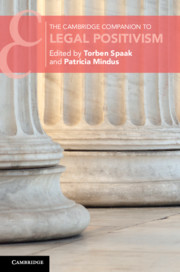Book contents
- The Cambridge Companion to Legal Positivism
- Cambridge Companions to Law
- The Cambridge Companion to Legal Positivism
- Copyright page
- Contents
- Figures
- Contributors
- Acknowledgements
- 1 Introduction
- Part I Fundamentals
- Part II History
- Part III Central Figures
- 9 Jeremy Bentham and the Origins of Legal Positivism
- 10 John Austin
- 11 The Normative Power of the Factual: Georg Jellinek’s Phenomenological Theory of Reflective Legal Positivism
- 12 Hans Kelsen’s Non-Reductive Positivism
- 13 The Legal Positivism of H. L. A. Hart
- 14 From Savigny to Linguistic Analysis: Legal Positivism through Bobbio’s Eyes
- 15 Joseph Raz’s Approach to Legal Positivism
- 16 Bulygin’s Analytical Legal Positivism
- Part IV Main Tenets
- Part V Normativity and Values
- Part VI Critique
- Index
- References
11 - The Normative Power of the Factual: Georg Jellinek’s Phenomenological Theory of Reflective Legal Positivism
from Part III - Central Figures
Published online by Cambridge University Press: 21 January 2021
- The Cambridge Companion to Legal Positivism
- Cambridge Companions to Law
- The Cambridge Companion to Legal Positivism
- Copyright page
- Contents
- Figures
- Contributors
- Acknowledgements
- 1 Introduction
- Part I Fundamentals
- Part II History
- Part III Central Figures
- 9 Jeremy Bentham and the Origins of Legal Positivism
- 10 John Austin
- 11 The Normative Power of the Factual: Georg Jellinek’s Phenomenological Theory of Reflective Legal Positivism
- 12 Hans Kelsen’s Non-Reductive Positivism
- 13 The Legal Positivism of H. L. A. Hart
- 14 From Savigny to Linguistic Analysis: Legal Positivism through Bobbio’s Eyes
- 15 Joseph Raz’s Approach to Legal Positivism
- 16 Bulygin’s Analytical Legal Positivism
- Part IV Main Tenets
- Part V Normativity and Values
- Part VI Critique
- Index
- References
Summary
Starting out from the assumption that legal positivism is premised on the assumption of a strict separation between the world of law, the world of morals and the social or ethical world, Kersten explains that George Jellinek’s phenomenological theory of reflective legal positivism aims to answer the question of how the world of law is connected to and can respond to changes in the social world. The general idea of Jellinek’s legal positivism, Kersten explains, is that a state has two sides – a legal side and a social side – and three elements – people, territory and political power – and that these elements have to be structured and defined with the help of the concept of legal auto-limitation of political power, that is, the concept of the state’s capacity to limit its own power by incurring legally binding obligations. On this analysis, Kersten points out, the central element in Jellinek’s legal positivism is that of political power, which structures and defines the territory and the people (the citizens) and also structures and defines the state by binding it to legal rules, especially constitutional rules.
Keywords
- Type
- Chapter
- Information
- The Cambridge Companion to Legal Positivism , pp. 248 - 271Publisher: Cambridge University PressPrint publication year: 2021
References
- 2
- Cited by

